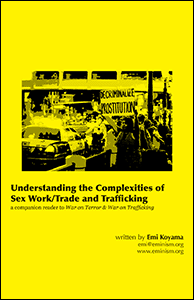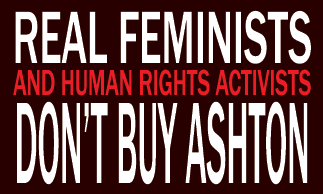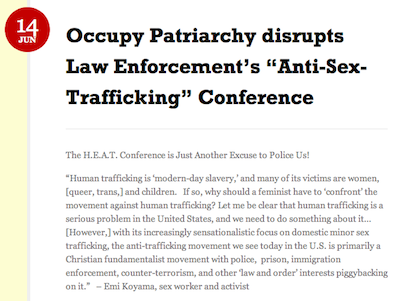On April 26th, I attended Portland Human Rights Commission’s public forum on human trafficking. Unlike many other “trafficking” events I’ve attended over the past several years, this one was specifically designed to address what the Commission called “transnational” human trafficking for labor exploitation. Speakers were mostly made up of law enforcement officers and immigration advocates, but the forum also featured a testimony from a Mexican man who had been trafficked at a small labor camp in Oregon. The only person on the panel I recognized was Detective Keith Bickford from Multnomah County Sheriff’s Office, who heads Oregon Human Trafficking Task Force.
Detective Bickford explained that there were two parts to the Oregon Human Trafficking Task Force. One of the areas is the domestic minor sex trafficking, which he thinks is doing pretty good in terms of public awareness and funding. The other part is those involving “foreign born” victims of labor trafficking, according to Bickford. The community often want to hear about domestic minor sex trafficking only, Bickford said, but the trafficking of “foreign born” labor trafficking must be addressed also.
Even as he stresses the importance of addressing all forms of human trafficking, I can’t help but think how his (and Oregon’s) formulation of human trafficking as domestic minor sex trafficking and transnational adult labor trafficking leave out many forms of human trafficking that actually take place in Oregon, such as domestic adult sex trafficking, sex trafficking of “foreign born” people, domestic labor trafficking, labor trafficking with sexual exploitation component, and labor trafficking of minors.
Bickford adds that ICE (Immigration and Customs Enforcement) is doing a great job assisting foreign born victims of human trafficking, even though the actual victims of trafficking and exploitation often feel fearful of immigration officers. He explains: trafficking victims fear police and ICE because governments and law enforcement officers in their home countries are often corrupt and abusive, so they associate government agents with that impression, even though such fears are unwarranted in the U.S. Yeah right, that’s why American youth who engage in sex trade totally feel comfortable and safe with the police. Not.
Throughout the forum, I notice that panelists are using phrases “trafficking of foreign born victims” and “transnational trafficking” interchangeably, but that is not accurate. Those who entered into the U.S. consensually (either legally or illegally) and then were trafficked domestically tend to have less rights and protections than those who had been trafficked from the beginning. Because trafficking often involves deception, it is often difficult to tell the difference between the two.
Immigration advocates know how difficult it is to secure protections for victims of labor trafficking and exploitation unless there is a strong indication or evidence of inculpability, as explained by immigration attorney Stephen Manning from Immigrant Law Group PC. “The distinction between (consensual) migrant smuggling and human trafficking is clear legally, but it is very subtle in reality.”
An audience member asked Bickford about the magnitude of transnational human trafficking in Oregon. He responded that he was unaware of any figure, though Oregon’s farm labor camps are known among immigrants from South and Central America as a destination.
Next, Manning introduced one of his former clients, a Mexican man who has been abused and exploited in an Oregon labor camp. He spoke about circumstances that led to his arrival in Oregon, his experiences at the labor camp, and how a Christian pastor who visited him eventually made his captors afraid of being exposed and abandon him. I elect not to publish any further details of his story, but he quickly left the room after giving his testimony.
Another immigration attorney, Anna Ciesielski from Immigration Counseling Services spoke next. She works with Bickford on cases involving human trafficking, and discussed difficulty having her clients trust him. The law enforcement wants to arrest traffickers, she explained, but they can’t do so without cooperation from victims, she said. She also spoke about how Catholic Charities’ loss of a major federal grant for assisting immigrant victims of human trafficking has left a gaping hole of services for the victims.
Ciesielski’s office has worked with about ten immigrant victims of human trafficking so far this year, she said. Because resources are limited, they are able to take only the “strongest cases” that are likely to lead to a special trafficking victim visa.
Senior assistant attorney general Diane Schwartz Sykes came up next. Prior to joining the Oregon Department of Justice to lead its Civil Rights Unit, she has worked for Oregon Law Center and Legal Aid Services of Oregon, specializing in immigration and civil rights cases, during which she has visited many labor camps throughout the State. For every registered labor camps she visited, she observed a couple of small ones that aren’t registered (in Oregon, labor camps must be registered if they hire more than a certain number of workers).
Chris Killmer from Catholic Charities explained how funding cut had forced the organization to abandon some of its services for victims of trafficking, but it keeps receiving referrals from other organizations. In the two years that the organization was funded to provide services, Catholic Charities worked with about 60 victims, 65% of which came from Latin America. Portland is also a point of entry for Asian immigrants and trafficking victims. Real numbers are difficult to uncover because this is a hidden population.
Asked about outreach to labor camps, Sykes stated how it became more difficult for her to reach out since becoming a government officer. Government agencies such as BOLI (Bureau of Labor and Industries which handles discrimination cases), OSHA (occupational safety and health), Human Rights Task Force, and ICE have interest in finding out what goes on at labor camps, but are not welcomed. Religious communities and legal advocates have easier time accessing laborers.
Sykes also mentioned that many laborers speak indigenous languages, rather than English or Spanish, which makes it even more difficult to outreach. Their children, if any, may speak English through Head Start program and such, but are also vulnerable to abuse and exploitation.
At that point, an audience member who is a representative from the U.S. Attorney’s Office was invited to make a statement, which she was completely unprepared for. She admitted that she had no experiences in advocating for, investigating, or litigating human trafficking cases, though her boss (U.S. Attorney S. Amanda Marshall) considers the issue “a high priority.” Everything she said came from trainings she received for her job, not from any actual experiences addressing human trafficking.
But it is then she slipped the information that confirmed what many activists knew was the case but most government experts were smart enough to conceal: that the U.S. Attorney’s Office views domestic minor sex trafficking as “primarily gang-related,” and has moved the issue to its “gang unit”; transnational human trafficking on the other hand was moved to the civil rights unit.
The admission that the U.S. Attorney’s Office views domestic minor sex trafficking as a “gang-related” problem is significant. While right-wing anti-trafficking groups such as Shared Hope International has always insinuated racial overtones to the issue (e.g. urban Black men kidnapping suburban white schoolgirls), government officials tended to be more careful in how they communicate the issue. With the admission, however, it should now be a public knowledge that human trafficking is becoming yet another way for young men of color to be criminalized and imprisoned, while leaving behind many economic and social circumstances that lead many youth to engage in the sex trade.
The rep from the U.S. Attorney’s Office continuously praises her boss to the point I get embarrassed for her. An audience member comments how the “turf war” between State and federal officers are often obstacles, to which she responds “it depends on the individual–call my boss if you have any issues.”
Someone in the audience commented that victims of human trafficking like the man who gave his testimony should be supported so that they can become leaders and educators in the battle against human trafficking, rather than simply having their stories used. Bickford and Sykes respond, but they don’t seem to get it: Bickford says how he appreciates victims because he learns a lot from talking with them, and Sykes talks about how victims can make good outreach workers because they speak indigenous languages being spoken by other laborers. They don’t get it.
Frustrated, Jeri Williams–a Portland city employee with background in environmental and labor activism who identifies herself as a survivor of sex trafficking–speaks out: when Human Trafficking Task Force and others ask survivors of trafficking to “tell their stories” without payment, they are continuing the exploitation rather than fighting it–especially when celebrity speakers are paid thousands of dollars to be keynote speakers for anti-trafficking conferences (Williams didn’t name the conference, but I believe she is referring to the 2011 Northwest Coalition Against Trafficking conference which paid actress Daryl Hannah to keynote). I disagree with Williams on many things (after all she supports “end demand” campaigns that I think are ineffective and harmful for women), but I totally respect her for speaking out on this and supported her unsuccessful bid for the City Council this year.
Williams further spoke about how New Options for Women which provides drug treatment and other services to adult women who have prostitution records is facing budget elimination and stresses how we must salvage it. Another audience member who works for Multnomah County spoke out against Secure Communities initiative which prevents immigrant communities from cooperating with the law enforcement because of the fear that such contacts would lead to immigration detention and deportation of their family and community members. In response, Bickford stated that he was just a lowly detective in the law enforcement but he has been educating himself about the issues, carefully avoiding any statement that can be perceived as too political.
Overall, the forum was informative in terms of the government’s perspective of human trafficking in Oregon: that they seem to only recognize two variations of human trafficking (domestic minor sex trafficking on one hand, and transnational adult labor trafficking in the other), and that domestic minor sex trafficking is now being treated as a “gang-related” issue. It was also interesting to observe that, other than Jeri Williams, none of the people who are involved in the movement against sex trafficking were in the audience (in fact, there was a leader of an anti-prostitution group in the audience at the beginning, but she left after finding out that the forum focused on transnational labor trafficking), further demonstrating how we perceive a clear division between the two officially recognized categories of human trafficking–which, to borrow Manning’s phrase, may be more subtle in reality.



